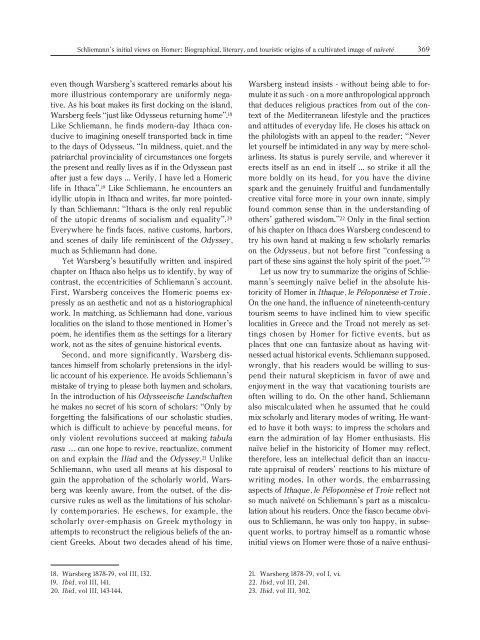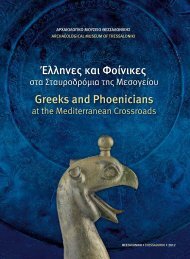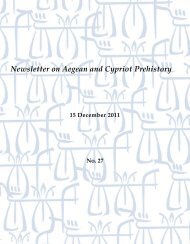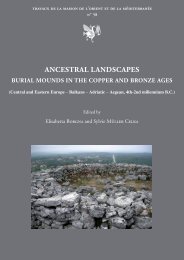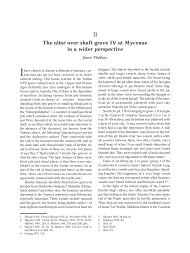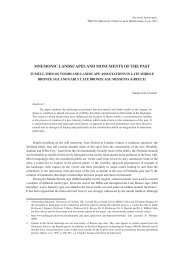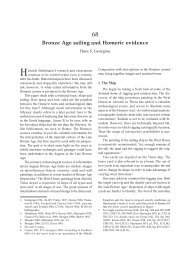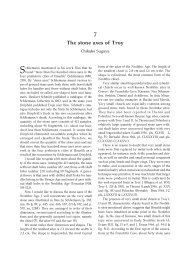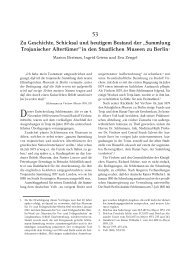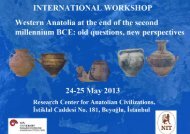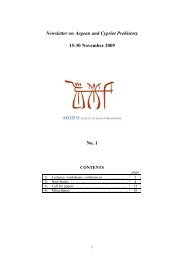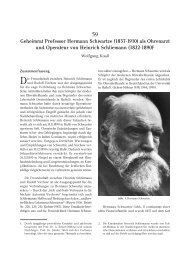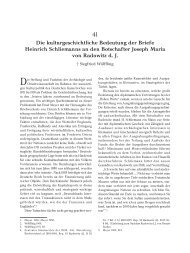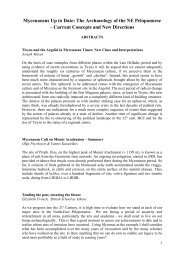- Seite 1 und 2:
ΑΡΧΑΙΟΛΟΓΙΑ ΚΑΙ ΕΡ
- Seite 3 und 4:
Περιεχόμενα - Contents -
- Seite 5 und 6:
Περιεχόμενα - Contents -
- Seite 7:
Περιεχόμενα - Contents -
- Seite 10 und 11:
XΠρόλογος - Foreword - Vorw
- Seite 13 und 14:
Κατάλογος συμμετεχ
- Seite 15 und 16:
Κατάλογος συμμετεχ
- Seite 17 und 18:
Χαιρετισμοί - Opening ce
- Seite 19 und 20:
Χαιρετισμοί - Οpening c
- Seite 21 und 22:
Χαιρετισμοί - Οpening c
- Seite 23 und 24:
Χαιρετισμοί - Οpening c
- Seite 25 und 26:
Χαιρετισμοί - Οpening c
- Seite 27 und 28:
Χαιρετισμοί - Οpening c
- Seite 29 und 30:
Χαιρετισμοί - Οpening c
- Seite 31 und 32:
Χαιρετισμοί - Οpening c
- Seite 33 und 34:
Χαιρετισμοί - Οpening c
- Seite 35 und 36:
Χαιρετισμοί - Οpening c
- Seite 37 und 38:
Πρόγραμμα Συνεδρίο
- Seite 39 und 40:
Πρόγραμμα Συνεδρίο
- Seite 41 und 42:
Επιτροπές - Committees - K
- Seite 43 und 44:
Δελτία τύπου - Press rel
- Seite 45 und 46:
Δελτία τύπου - Press rel
- Seite 47 und 48:
Ψήφισμα 21 ης Απριλί
- Seite 49 und 50:
Κατάλογος δημοσιευ
- Seite 51:
Συντομογραφίες - Abbr
- Seite 55 und 56:
1On the beginnings of field archaeo
- Seite 57:
On the beginnings of field archaeol
- Seite 60 und 61:
8 Manfred Korfmannthe epithet “wi
- Seite 62 und 63:
10 Manfred Korfmannfinds and contex
- Seite 64 und 65:
12 Manfred Korfmannsplitting, uncon
- Seite 66 und 67:
14 Manfred Korfmannmight otherwise
- Seite 68 und 69:
16 Donald F. EastonFig. 1. Reconstr
- Seite 70 und 71:
18 Donald F. Eastonmann 1880 no. 14
- Seite 72 und 73:
20 Donald F. EastonFig. 5. Reconstr
- Seite 74 und 75:
22 Donald F. EastonFig. 9. Pottery
- Seite 76 und 77:
24 Donald F. EastonIn terms of rela
- Seite 78 und 79:
26 Donald F. EastonTo the architect
- Seite 80 und 81:
28 Donald F. EastonFig. 18. Reconst
- Seite 82 und 83:
30 Donald F. EastonFig. 20. Chronol
- Seite 84 und 85:
32 Donald F. Easton99-153.Evans, R.
- Seite 86 und 87:
34 Donald F. EastonWeninger, B., 19
- Seite 88 und 89:
36 Edmund Bloedowstatements in this
- Seite 90 und 91:
38 Edmund Bloedowarchaeological sen
- Seite 92 und 93:
40 Edmund Bloedowobjection”, we w
- Seite 94 und 95:
42 Edmund BloedowTo sum up, in view
- Seite 96 und 97:
44 Martin EmeleAlle publizierten Br
- Seite 98 und 99:
46 Martin Emele9. und 8. Jahrundert
- Seite 100 und 101:
48 Martin EmeleNiedergang der myken
- Seite 103 und 104:
Troy and the lower Danube region at
- Seite 105 und 106:
Addendum: Troy VII and the north-ea
- Seite 107:
Addendum: Troy VII and the north-ea
- Seite 111 und 112:
Diaconu, P., 1990. ‘Harpoane de b
- Seite 113 und 114:
6Troas und die Kykladen: Vorbronzez
- Seite 115 und 116:
Troas und die Kykladen: Vorbronzeze
- Seite 117 und 118:
7The stone axes of TroyChikako Suga
- Seite 119 und 120:
The stone axes of Troy 67ChiselsAdz
- Seite 121 und 122:
The stone axes of Troy 69Tepe, Bes,
- Seite 123 und 124:
Schliemann’s Mycenae Albums 71in
- Seite 125 und 126:
Schliemann’s Mycenae Albums 73Fig
- Seite 127 und 128:
Schliemann’s Mycenae Albums 75Fig
- Seite 129 und 130:
Schliemann’s Mycenae Albums 77Fig
- Seite 131 und 132:
9Schliemann’s Mycenae excavations
- Seite 133 und 134:
Schliemann’s Mycenae excavations
- Seite 135 und 136:
Schliemann’s Mycenae excavations
- Seite 137 und 138:
10Die Schachtgräber von Mykene und
- Seite 139 und 140:
Die Schachtgräber von Mykene und d
- Seite 141 und 142:
Die Schachtgräber von Mykene und d
- Seite 143 und 144:
Die Schachtgräber von Mykene und d
- Seite 145 und 146:
11The altar over shaft grave IV at
- Seite 147 und 148:
The altar over shaft grave IV at My
- Seite 149 und 150:
The altar over shaft grave IV at My
- Seite 151 und 152:
The altar over shaft grave IV at My
- Seite 153 und 154:
The altar over shaft grave IV at My
- Seite 155 und 156:
The altar over shaft grave IV at My
- Seite 157 und 158:
Die Bernsteinschieber von Mykene 10
- Seite 159 und 160:
Die Bernsteinschieber von Mykene 10
- Seite 161 und 162:
Die Bernsteinschieber von Mykene 10
- Seite 163 und 164:
Die Bernsteinschieber von Mykene 11
- Seite 165 und 166:
Die Bernsteinschieber von Mykene 11
- Seite 167 und 168:
Die Bernsteinschieber von Mykene 11
- Seite 169 und 170:
Die Bernsteinschieber von Mykene 11
- Seite 171 und 172:
Weapons in the Shaft Graves of Myce
- Seite 173 und 174:
Weapons in the Shaft Graves of Myce
- Seite 175 und 176:
Weapons in the Shaft Graves of Myce
- Seite 177 und 178:
100 Jahre Ausgrabungen in Tiryns: A
- Seite 179 und 180:
100 Jahre Ausgrabungen in Tiryns: A
- Seite 181 und 182:
100 Jahre Ausgrabungen in Tiryns: A
- Seite 183 und 184:
Γεωλογικές παρατηρ
- Seite 185 und 186:
Γεωλογικές παρατηρ
- Seite 187 und 188:
Γεωλογικές παρατηρ
- Seite 189 und 190:
Γεωλογικές παρατηρ
- Seite 191 und 192:
A physical and human geographic app
- Seite 193 und 194:
A physical and human geographic app
- Seite 195 und 196:
H µεσοελλαδική κερα
- Seite 197 und 198:
H µεσοελλαδική κερα
- Seite 199 und 200:
H µεσοελλαδική κερα
- Seite 201 und 202:
H µεσοελλαδική κερα
- Seite 203:
H µεσοελλαδική κερα
- Seite 207 und 208:
18Heinrich Schliemann und Ankershag
- Seite 209 und 210:
Heinrich Schliemann und Ankershagen
- Seite 211 und 212:
Heinrich Schliemann und Ankershagen
- Seite 213 und 214:
Heinrich Schliemann und Ankershagen
- Seite 215 und 216:
Heinrich Schliemann und Ankershagen
- Seite 217 und 218:
Name und Wappen unserer Familie Sch
- Seite 219 und 220:
Name und Wappen unserer Familie Sch
- Seite 221 und 222:
Name und Wappen unserer Familie Sch
- Seite 223 und 224:
20Heinrich Schliemanns russische Pe
- Seite 225 und 226:
Heinrich Schliemanns russische Peri
- Seite 227 und 228:
Heinrich Schliemanns russische Peri
- Seite 229 und 230:
Abb. 1. Der Stammbaum der Familie H
- Seite 231:
Heinrich Schliemanns russische Peri
- Seite 235 und 236:
Heinrich Schliemann als Großkaufma
- Seite 237 und 238:
Ἑρρῖκος Σλῆμαν (182
- Seite 239 und 240:
Ἑρρῖκος Σλῆμαν (182
- Seite 241 und 242:
Ἑρρῖκος Σλῆμαν (182
- Seite 243 und 244:
Ἑρρῖκος Σλῆμαν (182
- Seite 245 und 246:
Ἑρρῖκος Σλῆμαν (182
- Seite 247 und 248:
Ἑρρῖκος Σλῆμαν (182
- Seite 249 und 250:
Ἑρρῖκος Σλῆμαν (182
- Seite 251 und 252:
Ἑρρῖκος Σλῆμαν (182
- Seite 253 und 254:
Ἑρρῖκος Σλῆμαν (182
- Seite 255 und 256:
Ἑρρῖκος Σλῆμαν (182
- Seite 257 und 258:
Ἑρρῖκος Σλῆμαν (182
- Seite 259 und 260:
Ἑρρῖκος Σλῆμαν (182
- Seite 261 und 262:
Ἑρρῖκος Σλῆμαν (182
- Seite 263 und 264:
Ἑρρῖκος Σλῆμαν (182
- Seite 265 und 266:
Ἑρρῖκος Σλῆμαν (182
- Seite 267 und 268:
Ἑρρῖκος Σλῆμαν (182
- Seite 269 und 270:
Ἑρρῖκος Σλῆμαν (182
- Seite 271 und 272:
Ἑρρῖκος Σλῆμαν (182
- Seite 273 und 274:
Ἑρρῖκος Σλῆμαν (182
- Seite 275 und 276:
Ἑρρῖκος Σλῆμαν (182
- Seite 277 und 278:
Ἑρρῖκος Σλῆμαν (182
- Seite 279 und 280:
23Wiederentdecktes Griechenland. So
- Seite 281 und 282:
Wiederentdecktes Griechenland. Soph
- Seite 283 und 284:
Wiederentdecktes Griechenland. Soph
- Seite 285 und 286:
Wiederentdecktes Griechenland. Soph
- Seite 287 und 288:
Heinrich Schliemann, the linguist 2
- Seite 289 und 290:
Heinrich Schliemann, the linguist 2
- Seite 291 und 292:
Schliemanns archäologische Lebensl
- Seite 293 und 294:
Schliemanns archäologische Lebensl
- Seite 295 und 296:
Schliemanns archäologische Lebensl
- Seite 297 und 298:
Schliemann als Zeitgenosse 245seine
- Seite 299 und 300:
Schliemann als Zeitgenosse 247Schli
- Seite 301 und 302:
Schliemanns Beziehungen zu Berlin 2
- Seite 303 und 304:
Schliemanns Beziehungen zu Berlin 2
- Seite 305 und 306:
Schliemanns Beziehungen zu Berlin 2
- Seite 307 und 308:
28Die Verbundenheit Fürstenbergs z
- Seite 309:
III.H αλληλογραφία το
- Seite 312 und 313:
260 Galina Andrusovova′-Vlcekova
- Seite 314 und 315:
262 Wilfried Bölke und Reinhard Wi
- Seite 316 und 317:
31Heinrich Schliemann und die preu
- Seite 318 und 319:
266 Barbara Faensendeutsche Levante
- Seite 320 und 321:
268 Alexander K. GavrilovKommission
- Seite 322 und 323:
270 Alexander K. GavrilovÖffentlic
- Seite 324 und 325:
272 Alexander K. Gavrilovthe milk f
- Seite 326 und 327:
33Entwicklung von Forschungsmethode
- Seite 328 und 329:
276 Joachim Herrmannphische Methode
- Seite 330 und 331:
278 Joachim HerrmannLetzten Endes k
- Seite 332 und 333:
280 Johannes IrmscherJugendfreund W
- Seite 334 und 335:
282 Johannes Irmschermanns Unterneh
- Seite 336 und 337:
284 Johannes IrmscherMeter hoch und
- Seite 338 und 339:
286 Hans-Günter Buchholznoch im se
- Seite 340 und 341:
288 Hans-Günter BuchholzFunden die
- Seite 342 und 343:
290 Hans-Günter BuchholzProf. Geor
- Seite 344 und 345:
292 Hans-Günter Buchholzgie folgte
- Seite 346 und 347:
294 Hans-Günter Buchholzfahl eine
- Seite 348 und 349:
296 Hans-Günter Buchholznicht ganz
- Seite 350 und 351:
298 Hans-Günter BuchholzBewegung s
- Seite 352 und 353:
300 Hans-Günter BuchholzIch schlie
- Seite 354 und 355:
302 Hans-Günter Buchholzwenn Milch
- Seite 356 und 357:
304 Hans-Günter Buchholzhält, ist
- Seite 358 und 359:
306 Hans-Günter Buchholzchen und R
- Seite 360 und 361:
308 Hans-Günter BuchholzSchulze, E
- Seite 362 und 363:
310 Hans-Günter BuchholzAbb. 2. Br
- Seite 364:
312 Hans-Günter BuchholzAbb. 3b. B
- Seite 372 und 373: 320 Claudia Lang-Auingerersten Ber
- Seite 374 und 375: 322 Claudia Lang-Auingerberichtet a
- Seite 376 und 377: 324 \Aνδρέας Παναγόπο
- Seite 378 und 379: 326 \Aνδρέας Παναγόπο
- Seite 380 und 381: 39Wilhelm Dörpfeld: Schliemann’s
- Seite 382 und 383: 330 Kenneth W. Schaarancient buildi
- Seite 384 und 385: 332 Kenneth W. Schaarning of a care
- Seite 386 und 387: 334 Gerlinde GrahnMuseums zur Verf
- Seite 388 und 389: 336 Gerlinde Grahnganze Baustelle a
- Seite 390 und 391: 338 Gerlinde Grahntürkischen Staat
- Seite 392 und 393: 340 Gerlinde GrahnBericht der Gesan
- Seite 394 und 395: 342 Gerlinde Grahnschaften in Konst
- Seite 396 und 397: 344 Gerlinde Grahngeplanten Neubau
- Seite 398 und 399: 346 Gerlinde Grahntivem Bescheid zu
- Seite 400 und 401: 41Die kulturgeschichtliche Bedeutun
- Seite 402 und 403: 350 Siegfried WölfflingDörpfeld i
- Seite 404 und 405: 352 Siegfried Wölfflingaber als Fr
- Seite 407: IV.Φιλολογικές παρα
- Seite 410 und 411: 358 Egert PöhlmannToday, we again
- Seite 412 und 413: 360 Egert Pöhlmannare standing ins
- Seite 414 und 415: 362 Egert PöhlmannBes,ik Bay, dire
- Seite 416 und 417: 364 Egert PöhlmannLatacz, J., 1979
- Seite 418 und 419: 366 Mark Lehrermann embarked on his
- Seite 422 und 423: 370 Mark Lehrerast. There is, to be
- Seite 424 und 425: 372 Brigitte MannspergerAbb. 1. Pha
- Seite 426 und 427: 374 Brigitte Mannspergerden und der
- Seite 428 und 429: 376 Brigitte Mannspergerkampf Menel
- Seite 430 und 431: 378 Brigitte MannspergerMannsperger
- Seite 432 und 433: 380 David Turnerhere; only letters
- Seite 434 und 435: 382 David Turnerever. His attention
- Seite 436 und 437: 46Schliemann und die Schriftlichkei
- Seite 438 und 439: 386 Imre TegyeryEs war eigentlich e
- Seite 440 und 441: 388 Imre Tegyeryund Alphabet, Sylla
- Seite 443 und 444: 47Schliemann’s contribution to Gr
- Seite 445 und 446: Schliemann’s contribution to Gree
- Seite 447 und 448: Schliemann’s contribution to Gree
- Seite 449 und 450: Schliemann’s contribution to Gree
- Seite 451 und 452: Schliemann’s contribution to Gree
- Seite 453 und 454: 48^H àξιοπιστία τοÜ Σ
- Seite 455 und 456: ^H àξιοπιστία τοÜ Σλ
- Seite 457 und 458: Beobachtungen zur Chronologie und S
- Seite 459 und 460: Beobachtungen zur Chronologie und S
- Seite 461 und 462: Beobachtungen zur Chronologie und S
- Seite 463: VI.H Tρωική συλλογή κ
- Seite 466 und 467: 414 Manfred OppermannZunächst seie
- Seite 468 und 469: 51Der Schatten des geraubten Goldes
- Seite 470 und 471:
418 Leo S. KlejnLyshina verheiratet
- Seite 472 und 473:
420 Leo S. Klejnfend, daß er sie a
- Seite 474 und 475:
422 J. Lesley Fittonparagraph of a
- Seite 476 und 477:
424 J. Lesley Fittonsified account
- Seite 478 und 479:
426 Marion Bertram, Ingrid Griesa u
- Seite 480 und 481:
428 Marion Bertram, Ingrid Griesa u
- Seite 482 und 483:
430 Marion Bertram, Ingrid Griesa u
- Seite 484 und 485:
432 Wolfgang KuckenburgSchmucksache
- Seite 486 und 487:
434 Wolfgang KuckenburgAbbildung 1
- Seite 488 und 489:
436 Wolfgang Kuckenburggenannten ,,
- Seite 490 und 491:
438 Wolfgang KuckenburgWerkstatt, u
- Seite 493 und 494:
55Deutsche Pompeiana vom Wörlitzer
- Seite 495 und 496:
Deutsche Pompeiana vom Wörlitzer L
- Seite 497 und 498:
Deutsche Pompeiana vom Wörlitzer L
- Seite 499 und 500:
Deutsche Pompeiana vom Wörlitzer L
- Seite 501 und 502:
56Ιλίου Μέλαθρον. Η
- Seite 503 und 504:
Ιλίου Μέλαθρον. Η ο
- Seite 505 und 506:
Ιλίου Μέλαθρον. Η ο
- Seite 507 und 508:
Ιλίου Μέλαθρον. Η ο
- Seite 509 und 510:
Ιλίου Μέλαθρον. Η ο
- Seite 511 und 512:
Ιλίου Μέλαθρον. Η ο
- Seite 513 und 514:
Ιλίου Μέλαθρον. Η ο
- Seite 515 und 516:
Ιλίου Μέλαθρον. Η ο
- Seite 517 und 518:
57Das Schliemann-Haus im Spiegel gr
- Seite 519:
Das Schliemann-Haus im Spiegel grie
- Seite 523 und 524:
58Wie wirkte sich der zeitgenössis
- Seite 525 und 526:
Wie wirkte sich der zeitgenössisch
- Seite 527 und 528:
Wie wirkte sich der zeitgenössisch
- Seite 529 und 530:
Geheimrat Professor Hermann Schwart
- Seite 531 und 532:
Geheimrat Professor Hermann Schwart
- Seite 533 und 534:
The operation and death of Henry Sc
- Seite 535 und 536:
The operation and death of Henry Sc
- Seite 537 und 538:
Il funerale di Heinrich Schliemann
- Seite 539 und 540:
62Το ωτολογικό πρόβ
- Seite 541 und 542:
Tο ωτολογικό πρόβλη
- Seite 543 und 544:
Tο ωτολογικό πρόβλη
- Seite 545 und 546:
Ἡ ἐκτέλεσις τῆς δ
- Seite 547 und 548:
Ἡ ἐκτέλεσις τῆς δ
- Seite 549 und 550:
Ἡ ἐκτέλεσις τῆς δ
- Seite 551:
Ἡ ἐκτέλεσις τῆς δ
- Seite 555 und 556:
64Schliemann und HalleHans-Dieter Z
- Seite 557 und 558:
Schliemann und Halle 505Abb. 2. Die
- Seite 559 und 560:
Schliemann und Halle 507beherrschun
- Seite 561 und 562:
65Die ,,Heinrich-Schliemann-Gesells
- Seite 563 und 564:
Die ,,Heinrich-Schliemann-Gesellsch
- Seite 565 und 566:
Die ,,Heinrich-Schliemann-Gesellsch
- Seite 567 und 568:
Die ,,Heinrich-Schliemann-Gesellsch
- Seite 569 und 570:
Kein Museum für Schliemann. Eine B
- Seite 571 und 572:
67Ο Γεώργιος Καστρι
- Seite 573 und 574:
O Γεώργιος Kαστριώτ
- Seite 575 und 576:
68Bronze Age sailing and Homeric ev
- Seite 577 und 578:
Bronze Age sailing and Homeric evid
- Seite 579 und 580:
Bronze Age sailing and Homeric evid
- Seite 581:
Bronze Age sailing and Homeric evid


